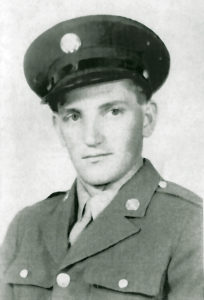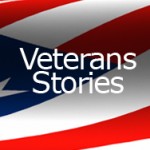
by Claude Davis, 119 AAA Bn, HQ Battery
The threat of war in the early forties made every young man fear entering the service. I did not desire to be in the Navy, so I hoped the Army would draft me. I failed my first physical, but eventually got another notice to report.
We embarked from New York in the fourth largest passenger ship in the world, the Mauritania—it held 16000 of us. I never knew water could go so high! We went up and down, waves so big they could hide the whole ship. I had the top hammock of four that would swing back and forth with the pitch of the ship, Eating was an adventure, where we would hang on to a pipe with one hand and eat with the other. 50 gallon barrels were placed every few feet for the guys who got seasick and could not hold their food. Man, I was sure glad I didn’t get the Navy!
While in England preparing for the trip to France, we set about the task of waterproofing our trucks. That was sure a chore. While I was there I had a trailer fall on my hand, breaking four fingers. There was no hospital around, so we just wrapped them up and kept going. When I finally got to a hospital, they had to rebreak them and set them in place. I had to fight to get back to my outfit and headed to Normandy with a cast on my right hand.
We left England on four LST’s and landed on Utah beach 30 days after the initial invasion. We arrived at 6PM and waited in the dark there. We heard planes overhead and could hear gun fire in the distance. We disembarked and had to keep our lights off, following the truck ahead. It seemed hours before we stopped for the night nearby a bridge we were to protect. The Germans bombed and strafed us all night. I tried to sleep to no avail. I spent most of my time trying to take off all of the waterproofing that I had installed.
The next morning, I saw my first dead German. He had been laying not 50 feet away. He wasn’t more than a kid …… but then, I thought …. so am I. As a scared young man, sleeping under the trucks and in dug foxholes, I found myself wondering why I was there. It didn’t really seem to be my fight and these guys looked the same as me. The war was a cruel, confusing thing.
We rolled through France and found ourselves by a farm when the Germans found us. They strafed us and blew the tires on my trailer, which had 500 Ibs of TNT in it. The first time they came at us, I got as far as the ditch. The second wave hit the ditch and took out the man next to me—the bullets went right by my side. So, you can imagine that by the time they got back, I was across the farm and into the woods for better protection. It was there that I realized it was kill or be killed. 4 to 6 inches and I would not here today to tell this. After the strafing, I ended up dragging that trailer for some 35 miles before we stopped for the night.
I recall one time when we stopped after dark and we were told to park our trucks for the night. I found this lane with trees on both sides that I felt was a better, secure place and settled in under the truck. In the middle of the night, the Germans hit us with all they had. Their 88s were clipping the tops of the trees that were not that tall. One shell whistled through the canvas back of my truck. It didn’t take me long to roll out from under that truck and run down the hill to better protection. We then got our chance to shoot back with our 90s. We lobbed shells back and forth.
It was about that time that my hand began to itch and smell. I went to see the medics and the doc there got angry—the cast should have come off weeks before. The cast was cut off and I regained use of my hand and fingers but boy, were they stiff. It was months before I got full use of them.
We moved up the Mosselle River in the direction of Belgium where we took part in the liberation of the town of Verdun where WWI ended. The name of our outfit is on a monument there. It was here that we were given a 7 day leave. I went to Paris and into Southern France to an old castle called Mont Saint-Michel.
We then began shuttling infantry to the frontline and prisoners back into France. Most of the prisoners were just happy that they did not have to fight anymore. We did this under the cover of darkness, watching the tail lights of the truck ahead. So, if they went into the ditch, so did you. One truck hit a landmine, killing some and injuring others. We loaded them into our trucks and kept going, leaving the dead behind to be picked up later. I broke down and when they fixed my truck, they kept my co-driver. I had to drive in the dark in unfamiliar territory by myself. It was scary, but I made it.
We were then sent back up to the front during the Battle of the Bulge, where the Germans made one last push back to Belgium. It was a hard and dirty fight, with some Germans dressing like us and driving our rigs. It was hard to know who the enemy was.
On one trip, one of our planes was shot down and landed in a motor pool that I was close by. The plane carried two thousand-pound bombs. The explosion blew a hole in the frozen ground 35 feet across and 15 feet deep. I dove under a trailer and things fell all around me. One of the plane’s motors dropped a few feet away from me. When I got my wits about me, I helped with the wounded. Eight ambulances took away the injured. When I got back to my truck, I found a bullet lodged in the padding of my driver’s seat. I have kept it all these years.
We crossed the Rhine on pontoon bridges that were just like big rubber rafts. They had metal rails laid out between them around 4 feet. These tracks were just wide enough for our tires and as we pulled out trucks with big guns across the half mile stretch, the trucks pushed down on the rafts so hard that they nearly went under. All this under enemy fire with shells coming down all around us. Somehow we all made it and were now in Germany. We crossed the Danube on Mayday of 1945 and moved into our last position. On May 9th, the firing stopped … the war had ended.
After the war, I didn’t have enough points to go home so I was sent to Metz, France to oversee a gas station there. Truck-loads of dead people were shuttled through that station. I had a detail of German prisoners who were tasked with running water and garbage to and from the kitchen. One of the prisoners did not want to be discharged, as he said he had no home to go to.
Finally, it was my turn and I was sent home with four of my buddies. After sailing to New York, we were lined up to go on a plane, but the line stopped some 35 ahead of me and I had to go by train. We later heard that the plane went down near Billings, killing all aboard. On Dec 18, 1945, I was discharged, arriving home before Christmas.
In those three years in Europe, I drove a truck more than 27,000 miles through England, France, Belgium, Germany, Austria, Italy, Switzerland, Czechoslovakia, and even Spain. I had three stripes on my sleeve (one for each year,) five battle stars for five major battles, and several ribbons, but the best being an honorable discharge.
I am Tech Corporal Claude Oliver Davis, a proud member of the “Bend Band of Brothers.”
